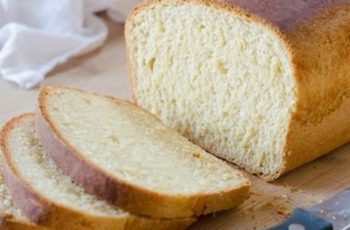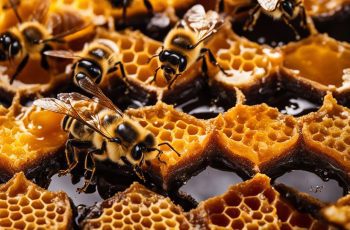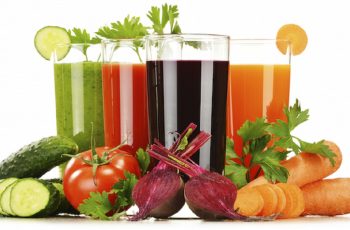Pretzels are a delightful and crunchy snack that can be a valuable addition to a balanced diet. Not only do they satisfy your cravings, but they also offer numerous health benefits. Made from simple ingredients like flour, water, and salt, pretzels are a low-fat and low-sugar option that provides a guilt-free indulgence.
One of the main health benefits of pretzels is their low-fat content. Unlike many other snack options, they don’t add unnecessary calories or unhealthy fats to your diet. This makes pretzels an excellent choice for those seeking to manage their weight or reduce their fat intake.
Pretzels can also be a great source of carbohydrates and protein. These macronutrients are essential for fueling your body and maintaining muscle health. If you’re an athlete or someone who needs some extra protein in their diet, pretzels can be a convenient and versatile option.
Pairing pretzels with other ingredients can further enhance their nutritional value. You can try dipping them in a variety of delicious options like hummus, yogurt, or even nut butter. Adding some cheese, nuts, or dark chocolate can also provide additional flavor and nutrients.
So, whether you’re looking for a satisfying snack or a source of energy, pretzels can be a smart choice. They are portable, convenient, and can be enjoyed anytime, anywhere. Grab a bag of pretzels and snack smart!
Unraveling the Health Benefits of Pretzels
- Pretzels are a low-fat and low-sugar snack option that can be a valuable addition to a balanced diet.
- They provide a satisfying treat without adding unnecessary calories or unhealthy fats.
- Pretzels are a good source of carbohydrates and protein, making them versatile for athletes or those seeking to increase protein intake.
- Pairing pretzels with dips, cheeses, nuts, yogurt, or dark chocolate can enhance their flavor and provide additional nutrients.
- Pretzels are convenient and portable, making them a perfect on-the-go snack option.
The Nutritional Comparison: Pretzels vs. Potato Chips
When comparing pretzels and potato chips, it’s important to consider their nutritional profiles. Pretzels generally have fewer calories and lower fat content compared to potato chips. A serving of pretzels typically contains around 110 calories, while the same amount of potato chips can have up to 160 calories. Pretzels are also lower in fat, making them a healthier option for those watching their fat intake. However, it’s important to note that the type of fat used in potato chips can vary, and some brands offer healthier options made with better oils. Overall, if you’re looking for a snack with fewer calories and less fat, pretzels are the better choice.
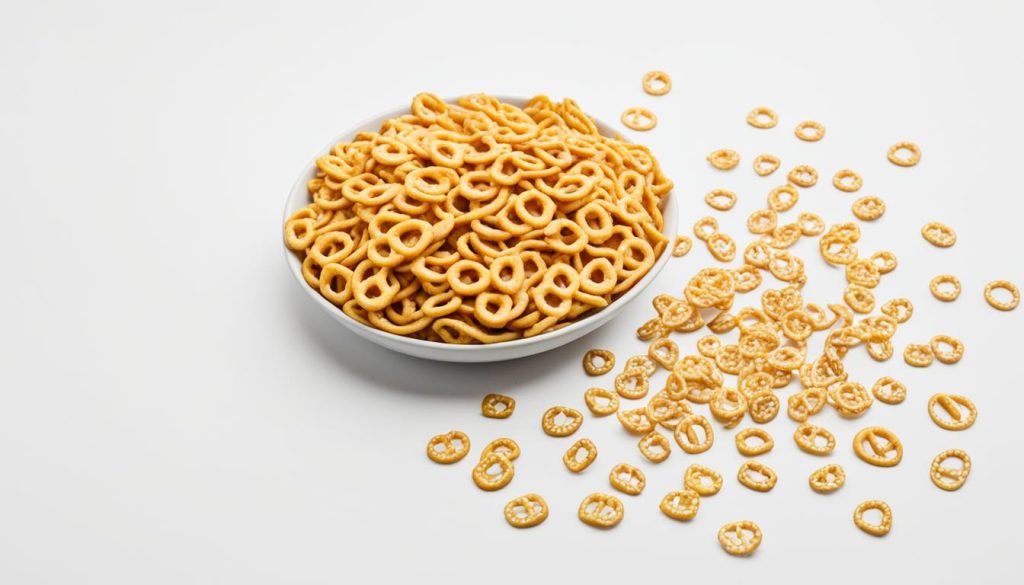
While pretzels and potato chips may both satisfy your snacking cravings, pretzels come out on top when it comes to calorie and fat content. The next time you reach for a snack, consider opting for pretzels to enjoy a healthier choice without sacrificing taste.
The Health Impacts: Pretzels and Chips
The impact of pretzels and potato chips on health goes beyond their nutritional content. As someone who cares about my well-being, I understand the importance of making informed choices when it comes to snacking. So, let’s delve into the health impacts of these popular snacks.
Pretzels
Pretzels, while low in fat, can have a high sodium content. This can be a concern for individuals with high blood pressure or heart disease. Excessive sodium intake can lead to water retention and increased blood pressure levels. It’s important to monitor sodium consumption and limit the intake of high-sodium snacks like pretzels.
In addition to sodium, pretzels can also cause a spike in blood sugar levels. This is due to their refined flour content, which gets quickly absorbed into the bloodstream, leading to a rapid increase in blood glucose levels. Individuals with diabetes or those monitoring their blood sugar levels should be mindful of this impact.
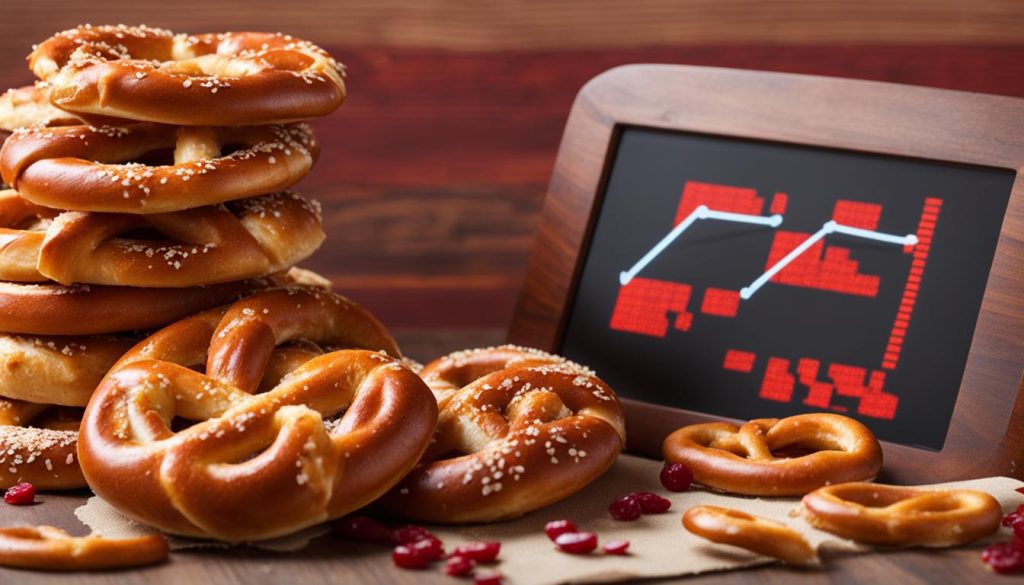
Potato Chips
Potato chips, on the other hand, tend to be higher in calories and fat compared to pretzels. However, their impact on blood sugar levels is relatively lower. This is because the complex structure of potato chips results in slower digestion, leading to a more gradual rise in blood glucose levels. Nonetheless, the high calorie and fat content of potato chips can have long-term health consequences if consumed excessively.
It’s crucial to practice portion control and not rely heavily on potato chips as a regular snack. Ideally, it’s best to choose healthier alternatives that offer a balance of flavor, nutrition, and satisfaction.
Considering Heart Health
Both pretzels and potato chips should be consumed in moderation when it comes to heart health. Pretzels’ lower fat content makes them a better option in terms of reducing the risk of cardiovascular issues compared to potato chips. However, the high sodium content in pretzels can negatively affect individuals with existing heart conditions or high blood pressure.
It’s essential to make conscious choices and keep an eye on portion sizes. Opting for low-sodium pretzel varieties or other heart-healthy snacks can be a wiser choice for individuals concerned about their heart health.
As always, consulting with a healthcare professional or registered dietitian can provide personalized guidance on making healthier snack choices that align with your specific health needs.
Healthy Snack Alternatives
If you’re looking for healthier alternatives to pretzels and potato chips, there are plenty of options available. Here are some delicious and nutritious snack alternatives that will satisfy your cravings:
- Nuts: Nuts, such as almonds, walnuts, and cashews, are packed with healthy fats, protein, and fiber. They make a filling and satisfying snack option.
- Seeds: Seeds like chia, flax, and pumpkin seeds are rich in nutrients and provide a good source of protein and fiber. They can be eaten on their own or added to yogurt or smoothies for extra crunch.
- Fruits: Fresh fruits like apples, berries, and oranges are not only delicious but also loaded with vitamins, minerals, and antioxidants. They offer a natural sweetness and can be enjoyed as a healthy snack any time of the day.
- Whole grains: Opt for whole grain snacks like rice cakes, whole wheat crackers, or air-popped popcorn. These snacks provide complex carbohydrates and fiber, giving you a sustained source of energy.
- Vegetable sticks with hummus: Cut up some carrots, bell peppers, or cucumber sticks and dip them in a flavorful hummus. This combination adds extra vitamins, minerals, and fiber to your snack.
- Yogurt with berries: Enjoy a cup of low-fat yogurt topped with fresh berries for a nutritious and satisfying snack. Yogurt provides protein and calcium, while berries offer antioxidants and natural sweetness.
- Savory bars: Try savory bars made from ancient grains, beans, nuts, and seeds. These bars offer a convenient on-the-go option with a variety of flavors to satisfy your taste buds.
Remember to choose snacks that are rich in nutrients and offer a balance of flavors. These alternatives to pretzels and potato chips will not only keep you satisfied but also contribute to a healthier snacking routine.
The Importance of Taste and Protein in Healthy Snacks
When developing healthy snacks, taste and protein are key factors to consider. As a copywriting journalist, I have witnessed that consumers prioritize snacks that not only provide nutritional benefits but also taste great. Having a good amount of protein in snacks is also a crucial attribute that consumers look for.
When it comes to taste, savory flavors have consistently ranked high in recent snack launches. Popular options include chili, barbecue, sea salt, cheddar cheese, and cheese itself. These flavors add a delicious and satisfying element to the snacks, making them more enjoyable to consume.
In addition to taste, protein plays a vital role in satiety, weight management, and workout support. High protein snacks help individuals feel fuller for longer, which can aid in weight management and reduce unnecessary snacking. Protein is also essential for muscle recovery and growth, making it an important component for individuals leading an active lifestyle.
In response to the growing demand for healthier snacks, brands have been focusing on creating products that are high in protein, gluten-free, natural, and low in sugar. These attributes not only cater to the preferences of health-conscious consumers but also align with their dietary needs.
By combining taste and protein, brands can develop snacks that not only offer a delicious indulgence but also provide the necessary nutrients. This combination ensures that consumers can satisfy their cravings while making smart choices for their overall health and wellness.
Conclusion
Healthy snacking is essential for maintaining a balanced and nutritious diet. Pretzels, with their low fat and sugar content, can be a smart snacking choice when consumed in moderation. They offer numerous health benefits and can be enjoyed with various dips, cheeses, and other ingredients to enhance their flavor and nutritional value.
While pretzels do have a high sodium content, it’s important to manage portion sizes and opt for healthier options that are lower in sodium. By being mindful of our choices, we can still enjoy the benefits of pretzel snacks without compromising our overall health.
Furthermore, it’s worth exploring other nutritious snack options. Nuts, seeds, fruits, and whole grains are excellent choices for those looking to expand their snacking horizons. These alternatives provide essential nutrients, such as healthy fats, protein, fiber, and vitamins, which contribute to a well-rounded diet.
By incorporating a variety of healthy snacks into our daily routine, we can make smart snacking choices that support our overall well-being. Remember, snacking can be both enjoyable and nutritious when we make conscious decisions and prioritize our health.
FAQ
What are the health benefits of pretzels?
Pretzels are a low-fat and low-sugar snack that can be a smart choice for those looking to maintain a balanced diet. They provide carbohydrates and protein, making them a versatile option for athletes or those looking to increase their protein intake. Additionally, pretzels are convenient and portable, making them a great on-the-go snack.
How do pretzels compare to potato chips nutritionally?
Pretzels generally have fewer calories and lower fat content compared to potato chips. A serving of pretzels typically contains around 110 calories, while the same amount of potato chips can have up to 160 calories. Pretzels are also lower in fat, making them a healthier option for those watching their fat intake.
What are the health impacts of pretzels and potato chips?
While pretzels are low in fat, they can have a high sodium content, which may be a concern for individuals with high blood pressure or heart disease. Pretzels can also cause a spike in blood sugar levels due to their refined flour content. Potato chips, on the other hand, may have a more complex structure that leads to slower digestion and a lower impact on blood sugar levels. However, excessive consumption of potato chips can still lead to long-term health issues.
What are some healthy alternatives to pretzels and potato chips?
There are plenty of nutritious snack alternatives available. Nuts, seeds, and fruits provide healthy fats, protein, and fiber. Whole grains and high-fiber snacks like vegetable sticks with hummus or yogurt with berries are also excellent choices. Savory bars made from ancient grains, beans, nuts, and seeds offer a convenient on-the-go option with a variety of flavors.
What factors are important in creating healthy snacks?
Taste and protein are key factors to consider when developing healthy snacks. Consumers prioritize snacks that taste great and offer a good amount of protein. Popular savory snack flavors include chili, barbecue, sea salt, cheddar cheese, and cheese. By focusing on creating snacks that are both delicious and protein-rich, brands can meet the needs of health-conscious consumers.
In conclusion, what are the benefits of snacking on pretzels?
Pretzels offer numerous health benefits and can be a smart snacking choice when consumed in moderation. They are low in fat and sugar and can be paired with various dips, cheeses, and other ingredients to enhance their flavor and nutritional value. It’s important to manage portion sizes and choose healthier options that are lower in sodium. By incorporating a variety of healthy snacks into your diet, you can enjoy the benefits of snacking while maintaining a balanced and nutritious approach to eating.


